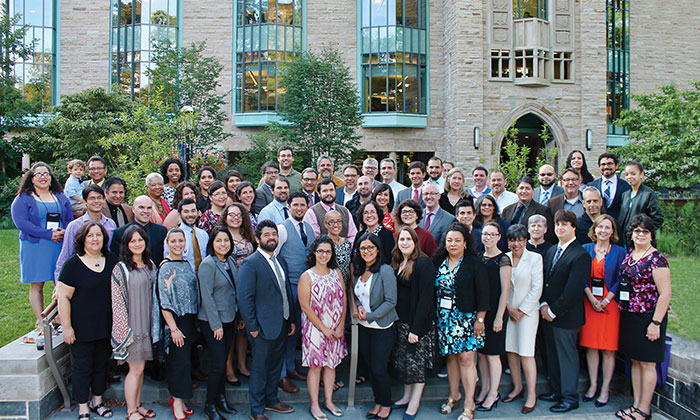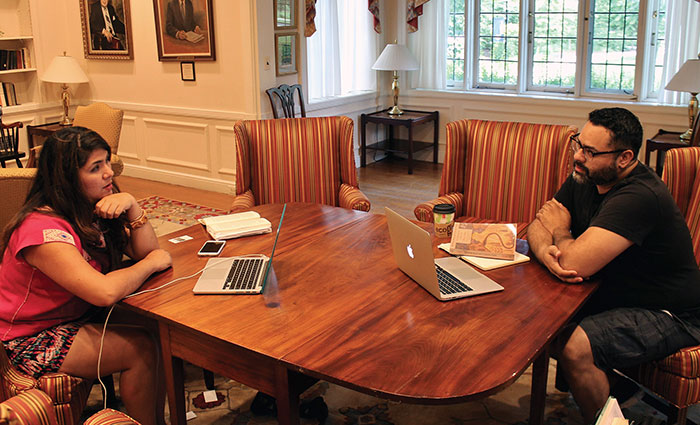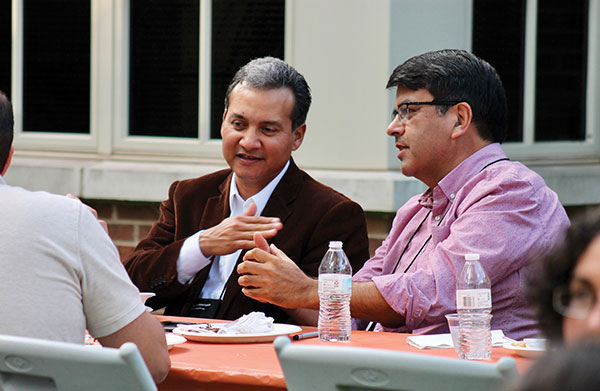
Since its launch in 1996, the Hispanic Theological Initiative (HTI) has weathered budget cuts, undergone an overhaul of its business model, and managed a move from Emory University to Princeton Theological Seminary. While change has been ongoing, positive student outcomes have remained constant: 97 percent of HTI scholars complete their doctoral degrees within five and a half years of enrolling in the program.
Such success has motivated 24 institutions — from Fuller Theological Seminary to the University of Notre Dame to Harvard Divinity School — to pay $6,500 annually for membership in the HTI Consortium. What they receive in return is substantial. First, consortium membership entitles schools to enroll students of Hispanic descent in a program that almost doubles the odds that participants will graduate. Joanne Rodriguez, long-time director of HTI, cites statistics that show that across the spectrum of postgraduate education, only about 50 percent of Ph.D. students eventually earn their doctoral degrees, while the high attrition rate costs institutions thousands of dollars in lost scholarship funds, staff time, and faculty salaries. Second, HTI creates a pipeline of highly qualified candidates for leadership roles in the classroom, in the church, and beyond.
 |
HTI director Joanne Rodriguez (bottom right) with 2017 Summer Workshop participants.
Credit: Benjamin Jacuk |
Although the mission of HTI is to create and nurture a community of Latino scholars, the program’s impressive numbers raise an obvious question. Could HTI strategies, so effective with Latino students, boost the retention rate among other segments of the student body?
“I think the program can work for anyone,” says Rodriguez. “Many times I’ve heard people say, ‘HTI is for students who only speak Spanish or who really need help.’ That’s not true. Our students are as bright and capable as any of their peers, but they sometimes need assistance in navigating a system that may be unfamiliar to them.”
In the past two decades, more than 100 program participants have successfully defended their dissertations and have been recruited to teach, direct programs, or serve nonprofit organizations in executive capacities. Some 82 percent of HTI alumni are full-time faculty members. Forty-two percent have earned tenure while an additional 29 percent are in tenure-track positions. “We’re very holistic in our approach,” says Rodriguez. “We make sure our participants understand that we’re not trying to ghettoize the Latino community, and we’re not preparing them to work only within that community. We want them to know they can use their education to make contributions in a number of ways. Their skill sets are never lost. They just have to be broad-minded in how to apply them.”
In the company of colleagues
Central to HTI’s design are highly personalized services that form a support system to address problems before students become discouraged and drop out. Professional development events are planned to align with scholars’ progress as they work through the hoops of their doctoral studies. Benefits include:
-
Attendance at annual summer workshops led by experienced facilitators and role models who focus on specific areas of study such as writing, pedagogy, and career orientation.
-
Assignment of senior scholars as mentors who help students navigate their doctoral requirements, expand their networking capacity, collaborate with campus advisors and faculty, and evaluate progress. The relationship is active for up to three years but often continues informally well into mentees’ first jobs.
-
Funds to gain access to Latino scholarly resources. Students have opportunities to meet and partner with future colleagues at national meetings, and they may request support for the publication of scholarly research.
When students begin work on their dissertations, additional support kicks in. An editor is assigned to provide one-on-one assistance at every step leading to completion of the degree. Writing retreats ensure uninterrupted time to assemble research and create early drafts. Participation in a weekend workshop at the Wabash Center exposes future educators to specific pedagogical issues. “All-but-dissertation” scholars become eligible to compete for one of 10 $25,000 HTI/Lilly Dissertation Fellowships that are awarded annually.
“HTI has completely shaped my doctoral experience,” says Erica Ramirez, a fellowship recipient who is wrapping up her dissertation at Drew Theological School in Madison, New Jersey. She describes the annual summer workshops as “touchpoints” that afford participants the opportunity to assess themselves, discuss their challenges, and receive help in overcoming difficulties with classes, advisors, or institutional resources. “HTI is really comprehensive,” she says. “I don’t know what my experience would have been like without it, and honestly, I don’t want to know.”
 |
Erica Ramirez and Rafael Reyes III
Credit: Benjamin Jacuk |
An unanticipated benefit of her participation in HTI has been a heightened appreciation of her heritage. “It’s not that I didn’t see myself as Latina. I did, and I was proud of it,” she says. “What I didn’t fully appreciate was my membership in a community that has faced challenges and for whom I could do good by earning my Ph.D. I had no idea what it would mean to participate in a community of scholars that shares an ethnic identity. HTI has built a consciousness that previously didn’t exist. The word ‘fellowship’ comes to mind.”
Mentors offer wisdom and friendship
A key to creating this sense of fellowship is matching each mentee with the right mentor. Again, a thorough understanding of the student’s background and field of study is essential. Joanne Rodriguez personally oversees the process and was responsible for matching Erica Ramirez with Daniel Ramirez (to whom she is not related). Dan, a graduate of Duke University’s Graduate Program in Religion, was part of HTI’s first cohort of scholars in 1997, and he shares Erica’s interest in and knowledge of Pentecostalism. Agreeing to the three-year commitment as her mentor was easy. He saw it as a logical way to give back to the program that had been meaningful to him.
“Part of the ethos of HTI is to think about those persons coming behind you,” says Dan, who has mentored three students. “In my case, I wanted to replicate the generous mentoring I had received from HTI and at Duke. Joanne [Rodriguez] reached out to me, and I was primed to say ‘yes’ to anything she asked me to do.”
 |
Mario Eduardo Alas-Escalante and Daniel Ramirez
Credit: Benjamin Jacuk |
Mentor requirements are extensive. Mentors must be tenured faculty or have at least seven years of teaching experience. They attend mentoring training at the summer workshops, check in with their mentees each month, visit their mentees’ institutions annually, submit various reports, and look for ways to help mentees succeed after graduation. “Dan has been instrumental in my transition into a working professional,” says Erica Ramirez. “He gave me extensive advice in the acquisition and acceptance of my first job. When he puts together a conference or a panel, it’s natural for him to invite his mentees to participate. If he sees a publication opportunity that he thinks might be fitting for one of us, he recommends it. He’s had a large impact on my career and has become a dear friend of my family.”
Dan Ramirez echoes Erica’s enthusiasm for their friendship and for the program at the center of their acquaintance. He describes HTI’s ongoing development as “organic” because it flows naturally from efforts to prepare rising Latino scholars who share a common heritage.
Continued expansion of the initiative seems likely for a variety of reasons. The growth of the Hispanic population in the United States is creating new opportunities for seminaries to reach out to the Latino church, learn about its needs, and design ways to meet those needs. Increased participation in HTI benefits the Latino community and, simultaneously, helps attract new students to careers in theological education. And Hispanic faculty members as campus role models draw still more students to the schools where these faculty teach.
“I think we’re at a moment when [the Latino church and U.S. seminaries] could meet each other halfway,” says Dan. “The church would send students, and the seminaries would open spaces and be willing to be transformed” by the presence of Latino faculty and students on campus.
Progress toward achieving this win–win scenario is slow. Erica recalls that at a recent meeting attended by representatives of 20 schools, more than half of the participants indicated they would like to be more engaged with the Latino community. What was missing from the conversation was any notion of how to develop and sustain such a relationship. “Because schools are pressed to demonstrate their long-term viability, they are seeing Latino students as a potential marketplace,” says Erica.
But how do they tap into the marketplace? “We already have a model,” explains Erica. “HTI is poised to inform schools of the potential, and show what conscientious and thoughtful engagement with Latino communities can look like.”
The Hispanic Theological Initiative at a glance
1996: A $3.5 million grant from the Pew Charitable Trusts establishes HTI at Emory University.
1999: HTI relocates to its permanent home at Princeton Theological Seminary.
2007: To ensure the program’s sustainability and lessen its dependence on grant support, the HTI Consortium forms. Some 24 participating schools now pay an annual membership fee of $6,500 to HTI plus a stipend directly to each student who takes part in the program.
2017–18: Forty-four scholars representing 22 schools are enrolled in HTI. These include five first-year students, eight second-year students, 17 students preparing for their comprehensive examinations, and 14 dissertation fellows.
Governance: A council comprised of presidents and deans from participating schools meets annually to review and approve recommendations from the consortium’s six-member steering committee. Chair of the member council and steering committee is Luis R. Rivera, vice president for academic affairs and academic dean at Garrett-Evangelical Theological Seminary.
For more information about HTI, visit hti.ptsem.edu and www.perspectivasonline.com.
